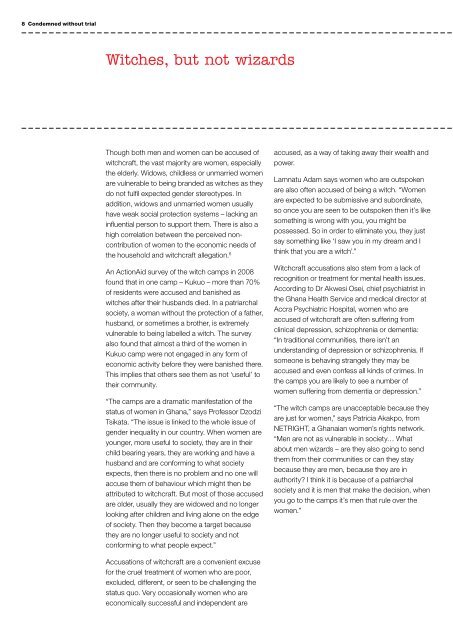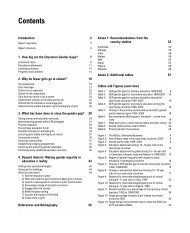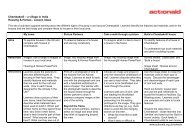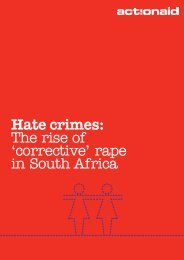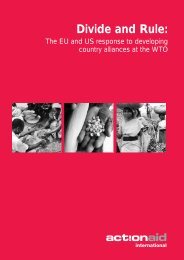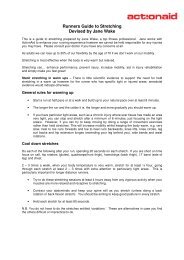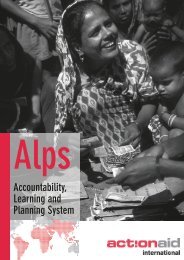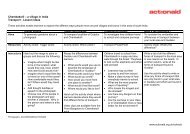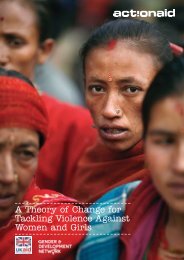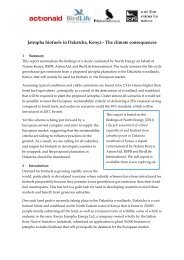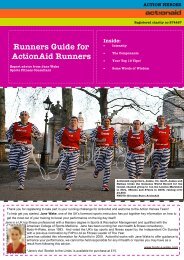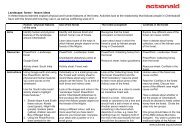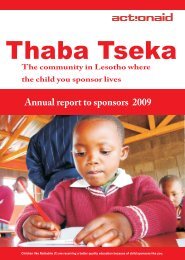women and witchcraft in Ghana - ActionAid
women and witchcraft in Ghana - ActionAid
women and witchcraft in Ghana - ActionAid
You also want an ePaper? Increase the reach of your titles
YUMPU automatically turns print PDFs into web optimized ePapers that Google loves.
8 Condemned without trial<br />
Witches, but not wizards<br />
Though both men <strong>and</strong> <strong>women</strong> can be accused of<br />
<strong>witchcraft</strong>, the vast majority are <strong>women</strong>, especially<br />
the elderly. Widows, childless or unmarried <strong>women</strong><br />
are vulnerable to be<strong>in</strong>g br<strong>and</strong>ed as witches as they<br />
do not fulfil expected gender stereotypes. In<br />
addition, widows <strong>and</strong> unmarried <strong>women</strong> usually<br />
have weak social protection systems – lack<strong>in</strong>g an<br />
<strong>in</strong>fluential person to support them. There is also a<br />
high correlation between the perceived noncontribution<br />
of <strong>women</strong> to the economic needs of<br />
the household <strong>and</strong> <strong>witchcraft</strong> allegation. 6<br />
An <strong>ActionAid</strong> survey of the witch camps <strong>in</strong> 2008<br />
found that <strong>in</strong> one camp – Kukuo – more than 70%<br />
of residents were accused <strong>and</strong> banished as<br />
witches after their husb<strong>and</strong>s died. In a patriarchal<br />
society, a woman without the protection of a father,<br />
husb<strong>and</strong>, or sometimes a brother, is extremely<br />
vulnerable to be<strong>in</strong>g labelled a witch. The survey<br />
also found that almost a third of the <strong>women</strong> <strong>in</strong><br />
Kukuo camp were not engaged <strong>in</strong> any form of<br />
economic activity before they were banished there.<br />
This implies that others see them as not ‘useful’ to<br />
their community.<br />
“The camps are a dramatic manifestation of the<br />
status of <strong>women</strong> <strong>in</strong> <strong>Ghana</strong>,” says Professor Dzodzi<br />
Tsikata. “The issue is l<strong>in</strong>ked to the whole issue of<br />
gender <strong>in</strong>equality <strong>in</strong> our country. When <strong>women</strong> are<br />
younger, more useful to society, they are <strong>in</strong> their<br />
child bear<strong>in</strong>g years, they are work<strong>in</strong>g <strong>and</strong> have a<br />
husb<strong>and</strong> <strong>and</strong> are conform<strong>in</strong>g to what society<br />
expects, then there is no problem <strong>and</strong> no one will<br />
accuse them of behaviour which might then be<br />
attributed to <strong>witchcraft</strong>. But most of those accused<br />
are older, usually they are widowed <strong>and</strong> no longer<br />
look<strong>in</strong>g after children <strong>and</strong> liv<strong>in</strong>g alone on the edge<br />
of society. Then they become a target because<br />
they are no longer useful to society <strong>and</strong> not<br />
conform<strong>in</strong>g to what people expect.”<br />
accused, as a way of tak<strong>in</strong>g away their wealth <strong>and</strong><br />
power.<br />
Lamnatu Adam says <strong>women</strong> who are outspoken<br />
are also often accused of be<strong>in</strong>g a witch. “Women<br />
are expected to be submissive <strong>and</strong> subord<strong>in</strong>ate,<br />
so once you are seen to be outspoken then it’s like<br />
someth<strong>in</strong>g is wrong with you, you might be<br />
possessed. So <strong>in</strong> order to elim<strong>in</strong>ate you, they just<br />
say someth<strong>in</strong>g like ‘I saw you <strong>in</strong> my dream <strong>and</strong> I<br />
th<strong>in</strong>k that you are a witch’.”<br />
Witchcraft accusations also stem from a lack of<br />
recognition or treatment for mental health issues.<br />
Accord<strong>in</strong>g to Dr Akwesi Osei, chief psychiatrist <strong>in</strong><br />
the <strong>Ghana</strong> Health Service <strong>and</strong> medical director at<br />
Accra Psychiatric Hospital, <strong>women</strong> who are<br />
accused of <strong>witchcraft</strong> are often suffer<strong>in</strong>g from<br />
cl<strong>in</strong>ical depression, schizophrenia or dementia:<br />
“In traditional communities, there isn’t an<br />
underst<strong>and</strong><strong>in</strong>g of depression or schizophrenia. If<br />
someone is behav<strong>in</strong>g strangely they may be<br />
accused <strong>and</strong> even confess all k<strong>in</strong>ds of crimes. In<br />
the camps you are likely to see a number of<br />
<strong>women</strong> suffer<strong>in</strong>g from dementia or depression.”<br />
“The witch camps are unacceptable because they<br />
are just for <strong>women</strong>,” says Patricia Akakpo, from<br />
NETRIGHT, a <strong>Ghana</strong>ian <strong>women</strong>’s rights network.<br />
“Men are not as vulnerable <strong>in</strong> society… What<br />
about men wizards – are they also go<strong>in</strong>g to send<br />
them from their communities or can they stay<br />
because they are men, because they are <strong>in</strong><br />
authority I th<strong>in</strong>k it is because of a patriarchal<br />
society <strong>and</strong> it is men that make the decision, when<br />
you go to the camps it’s men that rule over the<br />
<strong>women</strong>.”<br />
Accusations of <strong>witchcraft</strong> are a convenient excuse<br />
for the cruel treatment of <strong>women</strong> who are poor,<br />
excluded, different, or seen to be challeng<strong>in</strong>g the<br />
status quo. Very occasionally <strong>women</strong> who are<br />
economically successful <strong>and</strong> <strong>in</strong>dependent are


